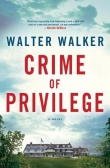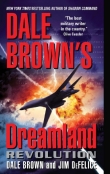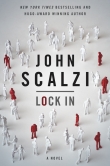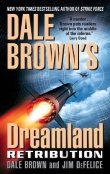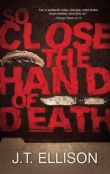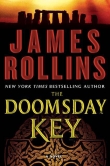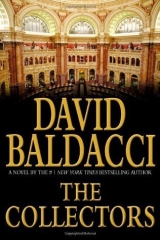
Текст книги "The Collectors"
Автор книги: David Baldacci
сообщить о нарушении
Текущая страница: 13 (всего у книги 27 страниц)
Chapter 30
They were all in the book vault after Annabelle had been given a brief tour of the main floor of the house. Caleb didn’t open the small safe behind the painting. He had no intention of letting anyone else see the Psalm Book. After she’d seen the collection, they went back upstairs, where Annabelle walked though the elegant rooms with probably more interest than she cared to show.
“So you’ve been here before?” Stone said.
She looked at him blankly. “I don’t remember saying whether I had or not.”
“Well, you knew Jonathan lived on Good Fellow Street. I just assumed.”
“People shouldn’t assume so much, they’d be better off.” She continued to look around. “The house hasn’t changed much,” she said, indirectly answering his question. “But at least he got rid of some of the uglier furniture. Probably after his mother died. I don’t think that would’ve been allowed until Elizabeth drew her last breath.”
“Where did you and Jonathan meet?” Caleb asked. She ignored this question. “He might’ve mentioned your name, but I don’t know what it is,” he persisted, drawing a warning look from Stone.
“Susan Farmer. We met out West.”
“Did you marry out there as well?” Stone interjected.
He was very impressed because she didn’t even flinch. But she didn’t answer him either.
Stone decided to play his ace. He pulled the photo out of his pocket. “We were told that Jonathan’s marriage had been annulled. Since you don’t like people making assumptions, I’m deducing from your tone about Elizabeth DeHaven that she was the instigator of that action. He kept this photo. The woman bears a remarkable likeness to you. My experience is that men don’t keep photos of women for just any reason. I think your case was special.”
He handed the photo over to her. This time he got a reaction. As Annabelle took the picture, her hand, rock–steady all these years, shook a bit, and her eyes opened a smidgen wider and appeared a little moist. She said wistfully, “Jonathan was a very handsome man. Tall, thick brown hair and eyes that just made you feel good about yourself.”
“And can I say you’re as lovely now as you were then,” Reuben added magnanimously, edging closer to her.
Annabelle didn’t seem to have heard Reuben. She did something she hadn’t done in a long time: She smiled, genuinely. “This was taken on the day of our wedding. It was my first, and only, marriage.”
“Where were you married?” Caleb asked.
“Vegas – where else?” she said, her gaze holding fast on the photo. “Jonathan was in town for a book convention. We hooked up, hit it off and were married. All in a week’s time. Pretty crazy, I know. At least that’s how his mother saw it.” She ran her finger along Jonathan’s frozen smile. “But we were happy. For a time anyway. We even lived here for a while with his parents after we were married, until we found a place to live.”
“Well, it is quite a large house,” Caleb said.
“Funny, it seemed far too small back then,” she remarked dryly.
“Were you out in Vegas for the book convention too?” Stone asked politely.
She handed the photo back, and Stone put it back in his jacket pocket. “Do you really need an answer to that question?”
“All right. Have you been in contact with Jonathan over the years?”
“And why would I need to tell you if I had?”
“And there’s no reason for you to,” Reuben piped in, scowling at Stone. “In fact, that’s getting a little personal.”
Stone was obviously put out by his smitten friend’s traitorous comment but said, “We’re doing our best to figure out what happened to Jonathan, and we need as much help as we can get.”
“His heart stopped beating and he died. Is it that unusual?”
Milton explained, “The medical examiner apparently couldn’t determine the cause of death. And Jonathan had just had a full cardio checkup at Johns Hopkins. He didn’t have a heart attack or anything else, apparently.”
“So you think someone killed him? Who could possibly have a problem with Jonathan? He was a librarian.”
“It’s not like librarians don’t have enemies,” Caleb said defensively. “Indeed, I’ve been around some colleagues who can get pretty mean–spirited after they’ve had a few glasses of merlot.”
She looked at him incredulously. “Yeah, I bet. But no one’s going to pop someone because they got fined for an overdue book.”
“Let me show you something,” Stone said. “It’s up in the attic.”
When they arrived there, Stone said, “That telescope is pointed toward the house next door.”
Reuben added, “Yeah, it was looking into the owner’s bed —”
Stone cut in. “I’ll explain, Reuben, if you don’t mind.” He raised his eyebrows and glanced at Annabelle.
Reuben said, “Oh, right. Yeah, go ahead and explain, Oliv – I mean, it was Frank, right? Or Steve?”
“Thank you, Reuben!” Stone snapped. “As I said, the telescope is pointed at the house next door. It’s owned by the head of Paradigm Technologies, one of the largest defense contractors in the country. The man’s name is Cornelius Behan.”
“He likes to be called CB,” Caleb added.
“Okay,” Annabelle said slowly.
Stone looked through the telescope, sweeping his gaze along the side of Behan’s house, which stood across a sliver of grass from DeHaven’s. “I thought so.” He motioned for Annabelle to take his place. She focused the telescope’s eyepiece on the spot where he’d been looking.
“It’s an office or a study,” she reported.
“That’s right.”
“You think Jonathan was spying on this guy?”
“Perhaps. Or he might have inadvertently seen something that led to his death.”
“So this Cornelius Behan killed Jonathan?”
“We have no proof. But strange things have been happening.”
“Like what?”
Stone hesitated. He had no intention of telling her about his being kidnapped. “Let’s just say that there’re enough questions here to make us look further. I think Jonathan DeHaven deserves that.”
Annabelle studied him for a moment and then took another look through the telescope. “Tell me about this CB guy.”
Stone briefly gave her a sketch of Behan and his company. Next he mentioned the murder of the Speaker of the House, Bob Bradley.
Annabelle again looked skeptical. “You don’t think that’s connected to Jonathan? I thought terrorists had claimed responsibility.”
Stone told her about the military contracts that Behan had won under the old regime. “Bradley’s predecessor as Speaker had been convicted of unethical practices, so it’s not a stretch to speculate that he might have been in Behan’s pocket. And then Bradley comes along as Mr. Clean, and Behan might not have wanted certain things to be investigated. So Bradley had to die.”
“And you’re thinking that Jonathan stumbled on this conspiracy, and they had to kill him before he could tell anyone?” She still sounded unconvinced, but not as much.
“What we have are two unsolved deaths of government people with Cornelius Behan as a common denominator and a neighbor of one of the dead men.”
Caleb added, “Behan was at the funeral today.”
Annabelle said sharply, “Which one was he?”
“Little redheaded guy —”
Annabelle finished for him, “Who thinks way too much of himself and had the tall bottle–blond wife who despises him.”
Stone looked impressed. “You sum people up quickly.”
“I’ve always seen an advantage in it. Okay, what’s our next move?”
Stone looked startled. “Our next move?”
“Yeah, once you give me a crash course on the info you’re obviously holding back, maybe we can make some real headway.”
“Miss Farmer,” Stone began.
“Just call me Susan.”
“I thought you said you weren’t going to be in town long.”
“Change of plan.”
“Can I ask why?”
“You can ask. Can we meet tomorrow morning?”
“Absolutely,” Reuben said. “And if you need a place to bunk —”
“I don’t,” she said.
“We can meet at my house,” Stone suggested.
“Where’s that?” she asked.
“At a cemetery,” Milton said helpfully.
Annabelle didn’t even raise an eyebrow.
Stone wrote down the address and directions. When she went to take it from him, she stumbled and fell against him, grabbing on to his jacket to keep from falling.
“Sorry,” she said as her hand closed around the photo in his pocket. A second later she was pulling it out. And then something happened that had never happened before. Stone’s hand closed around her wrist.
He said in a low voice so only she could hear, “All you had to do was ask for it.” He released his grip, and she smoothly slid the photo into her pocket, her startled gaze on Stone’s grim features. She regained her composure and faced the others. “I’ll see you tomorrow.”
Reuben took her hand, gently kissing it in the style of the centuries–ago French gentleman. “I want you to know what a true pleasure it’s been making your acquaintance, Susan.”
She smirked. “Thanks, Reuben. Oh, there’s a nice view of what I’m assuming is Behan’s bedroom from up here. He’s getting it on with some hot chick right now. You might want to check it out.”
Reuben whipped around. “Oliver, you didn’t tell me that.”
Annabelle looked back at an exasperated Stone. “That’s okay, Oliver, Susan’s not my real name either. What a shock, huh?”
A minute later they heard the front door open and close. Reuben quickly took up post at the telescope, but just as quickly moaned, “Damn, they must have already finished.” He turned to Stone and said reverently, “God, what a woman.”
Yes, thought Stone, what a woman indeed.
• • •
Annabelle climbed into her car, started it and then pulled out the photo, rubbing her wrist where Stone had grabbed it. The guy named Oliver had actually caught her picking his pocket. Even as a kid assigned by her father to fleece tourists in L.A., she’d never been caught in the act. Tomorrow might prove to be very interesting.
Her attention turned to the photo. It was amazing how one picture could bring back so many memories. That year of her life was the only truly normal one she ever had. Some might have thought it boring, or at least uneventful. She had considered it wonderful. She’d stumbled across a man who’d fallen in love with her. No ulterior motive, no hidden agenda, no leveraging for a bigger con down the road. He’d fallen in love with just her. A bookman and a con girl. All odds were against them making it, and as she well knew, only a fool bet against the odds.
And yet a gentle man who collected books had somehow captured her heart, toughened and scarred as it was. Early on in their relationship Jonathan had asked her if she collected anything. Annabelle had told him no, yet maybe that wasn’t true, she thought now. Perhaps she did collect something. Perhaps she collected lost chances.
She stared up at the big old house. In another life she and Jonathan might have lived there, with a passel of children, who knew? It was probably a good thing it hadn’t turned out that way. She would’ve likely made a terrible mother.
Her thoughts turned to the obvious issue. Jerry Bagger would be erupting in two days. The smart move would be to leave the country now, despite what she’d told the men about meeting tomorrow. It didn’t take her long to decide. She was staying and seeing it through. Maybe she owed it to Jonathan. Perhaps she owed it to herself. Because right now seemed a good time to end her collection of lost chances.
Chapter 31
Annabelle and the Camel Club gathered at Stone’s cottage at seven o’clock the next morning.
“Nice digs,” she said, gazing around the small interior. “And you have such quiet neighbors,” she added, motioning out the window to the tombstones.
“There are some dead people whose company I would prefer over that of certain of my living acquaintances,” Stone replied tersely.
“I can relate,” Annabelle said cheerfully, sitting down in front of the empty fireplace. “Let’s get to it, guys.”
Reuben sat next to her looking for the world like a large puppy hoping for a little scratch around the ears. Caleb, Milton and Stone sat across from them.
“Here’s my plan,” Stone said. “Milton will find out as much as possible about Bob Bradley. There may be something about that we can use. I’ll visit Bradley’s house, or rather what’s left of his house, and see what I can discover. Reuben used to be stationed at the Pentagon. He’ll work his contacts there to find out what he can about Behan’s military contracts that Bradley’s dethroned predecessor might have helped push through.”
Annabelle gazed at Reuben. “Pentagon, huh?”
He tried to appear modest. “Three tours of Nam too. Enough medals to decorate a damn Christmas tree. Hey, it’s all about serving your country.”
“I wouldn’t know,” Annabelle said, turning back to Stone. “But what about Jonathan’s death? How do we find out if someone killed him?”
“I have a theory about that, but it’ll require going to the Library of Congress and checking out the fire suppressant system there. The one problem with that is we don’t know where it’s located in the building. Caleb can’t find out because it’s classified for some reason. I guess so unauthorized persons couldn’t sabotage it, although I think that’s precisely what happened. The building is so massive that even if we could search room by room, it would take forever. We also need to see the configuration for the ventilation system for the room where Jonathan was found dead.”
She asked, “What’s this fire suppressant system got to do with anything?”
“I have a theory,” is all Stone would say.
“Wouldn’t the architect who did the building have the plans that would show both the fire system and the HVAC?” Annabelle pointed out.
“They would,” Stone said. “Although the Jefferson Building was built in the late 1800s, it underwent extensive renovation about fifteen years ago. The Architect of the Capitol has the plans, but we have no access to them.”
“Did they use a private architectural firm to help with the renovation?” she asked.
Caleb snapped his fingers. “You know, they did, one right here in D.C. I remember now, because the government was trying to stimulate the local economy and was getting more into public–private partnerships.”
“There’s your answer,” Annabelle said.
“I’m not following you,” Stone replied. “We still have no access to those plans.”
She looked at Caleb. “Can you get me the name of the firm?”
“I believe so.”
“The only issue will be whether they’ll let us take pictures of the plans. I doubt they will, and copying them is probably out too.” As she was thinking out loud, the Camel Club stared at her mystified. She finally noted this and said, “I’ll get us into the architectural firm, but we need copies of the designs if we’re going to locate the fire room and HVAC in the building.”
Milton said, “I have a photographic memory. If I look at the plans once, I can memorize them.”
She looked at him skeptically. “I’ve heard people make that claim before, and it never quite works out.”
“I can assure you that it ‘works out’ with me,” Milton said indignantly.
She grabbed a book off the shelf, opened it to a page in the middle and held it up in front of Milton. “Okay, read the page to yourself.” He did so and nodded. Annabelle turned the book around and looked at the page. “All right, Mr. Photo, start regurgitating.”
Milton read the page from memory, including punctuation marks, without one misstep.
For the first time in their company Annabelle looked impressed. “You ever been to Vegas?” she asked. He shook his head. “You might want to try it sometime.”
“Isn’t card counting illegal?” Stone asked, quickly deducing what she was alluding to.
She answered, “No, so long as you don’t use a mechanical or computer device to do it.”
“Wow,” Milton exclaimed. “I could make a fortune.”
Annabelle said, “But before you get your hopes up, even though it’s not illegal if you’re just using your brain, if they catch you, they’ll beat the crap out of you.”
“Oh!” Milton said, horrified. “Never mind.”
She turned to Stone. “So how do you think Jonathan was killed? And no more doublespeak or I walk.”
Stone studied her and then made up his mind. “Caleb found Jonathan’s body. Right after that he fainted. At the hospital the nurse said that he was getting better and that his temperature was coming up, not down.”
“And your point is?” Annabelle said.
“The fire suppressant system at the library uses a substance called halon 1301,” Caleb said, taking up the explanation. “It starts as a liquid in the pipes but turns into a gas when it comes out of the nozzle. It puts out fires in part by eliminating oxygen in the atmosphere.”
“Meaning Jonathan might have suffocated to death! Good God, you mean the police didn’t stumble across that possibility and check to see whether the gas cylinder was empty?” Annabelle said angrily.
“There was no evidence that the system was even engaged,” Stone said. “The warning horn didn’t sound, and Caleb learned that it was operational, although it could have been disconnected and then reattached later. And the gas leaves no residue.”
“And on top of that, halon 1301 could not have killed Jonathan, not at the levels that are used to suppress fires at the library,” Caleb added. “I checked it. That’s why it’s used in spaces occupied by people.”
“So where is this leading?” Annabelle asked. “You seem to be saying two different things. It was the gas but it wasn’t the gas. Which is it?” she demanded.
Stone took up the discussion. “One element of the suppressant being engaged is the lowering of the temperature in the room. Caleb said he saw Jonathan’s body, got an immediate chill and fainted. I believe the chill came from the gas, which led to the nurse’s comment in the hospital about Caleb’s temperature coming up. And I think Caleb fainted because the oxygen levels in the room were low, but not low enough to kill him, because he’d come into the room about a half hour after Jonathan.”
Annabelle said, “So it obviously wasn’t this halon 1301 stuff. So something else?”
“Exactly. We just have to find out what.”
Annabelle stood. “Okay, I need to start doing some serious prep work.”
Stone rose and faced her. “Susan, before you really become involved, you need to know that there are some very dangerous people tied up in this. I’ve already had evidence of that personally. It could be very risky for you.”
“Oliver, let me put it this way. If it’s any more dangerous than what I was involved in last week, I’d be floored.”
Stone looked stunned by this comment and stepped back.
Annabelle hooked an arm through Milton’s. “Okay, Milton, we need to spend some time together.”
Reuben looked crushed. “Why Milton?”
“Because he’s my little Xerox machine.” She pinched Milton’s cheek and he immediately turned red. “But first, we have to get him the right clothes, the right style.”
“What’s wrong with my clothes?” Milton said, looking down at his red sweater and jeans, both of which were impeccably cleaned and pressed.
“Absolutely nothing,” she said. “Except they’re all wrong for what I need.” She pointed at Caleb. “Call Milton with the name of the firm as soon as you get it.” She snapped her fingers. “Let’s go, Miltie.”
She strode out the door. A shocked Milton looked helplessly at the others and hissed, “Miltie?”
“Milton!” Annabelle called from outside the cottage. “Now!”
Milton shot out of the door. Reuben immediately whirled on Stone. “Are you just going to let her take him?”
“What exactly would you suggest I do, Reuben?” Stone said bluntly. “That woman is a hurricane and earthquake all rolled into one.”
“I don’t know, you could … I mean …” He plopped down in a chair and growled, “Damn it, why couldn’t I have a photographic memory!”
“Thank God you don’t,” Caleb exclaimed in a disgusted tone.
“What makes you say that?” Reuben demanded hotly.
“Because then she’d be calling you Ruby, and I’d have to be sick to my stomach.”
Chapter 32
Later that day at the library Caleb sent an e–mail to the administrative offices. An hour later he found out the name of the private architectural firm that had helped with the Jefferson Building’s renovation. He telephoned Milton with that information.
“How’s it going with that woman?” he said in a low voice.
Milton whispered back, “She just bought me a black suit and a really bright tie, and she wants to restyle my hair. You know, jazz me up.”
“Did she tell you why?”
“Not yet.” He paused, then added, “Caleb, she sort of scares me. She’s so, she’s so confident.” Milton had no way of knowing, but he had never uttered a truer statement.
“Well, you just hang in there, Miltie.” Caleb hung up, chuckling.
He next phoned Vincent Pearl, knowing that he would get the answering machine, since the rare book shop wasn’t open until later in the evening. The fact was he didn’t want to talk to the man because he hadn’t made up his mind what to do about the sale of Jonathan’s collection yet, but most of all he didn’t know what to do about the Psalm Book. When its existence was revealed, there would be a positive uproar in the rare book world. And he would be at the center of this maelstrom, a thought that terrified but also intrigued him. A little time in the spotlight wasn’t such a bad thing, particularly for a person used to operating in the obscurity of a library.
The only thing that stopped him from going full bore ahead was a nagging thought. What if Jonathan had gotten the Psalm Book somehow illegally? That might account for his secrecy about the book. Caleb didn’t want to do anything to besmirch his friend’s memory.
Caleb put these unsettling thoughts aside and walked over to speak to Jewell English, who, like the Hemingway lover, Norman Janklow, had been a regular in the reading room over the last few years.
As he walked toward her, Jewell took off her glasses, tucked her pages of carefully written notes inside a small manila folder and motioned for him to sit down next to her. When he did, she clutched his arm and said excitedly, “Caleb, I got a line on a mint Beadle. Maleska, the Indian Wife of the White Hunter. It’s a number one, Caleb.”
“I think we have a copy of that volume,” he said thoughtfully. “Make sure it’s in true mint condition, Jewell. The Beadles were cheaply put together.”
Jewell English clapped her hands together. “Oh, but, Caleb, isn’t it exciting, though? A number one.”
“Yes, it’s very exciting. And if you want me to look at it first, I’d be glad to.”
“Oh, you are a dear. I need to have you come over sometime for a drink. We have so much in common.” She patted his arm and raised her carefully penciled–in eyebrows suggestively.
Caught off guard, Caleb said hurriedly, “Yes, well, that would be nice. Someday. Maybe. In the future. Sometime. Perhaps.” He tried not to run back to his desk. Being hit on by a septuagenarian didn’t really do much for his ego. He quickly recovered his good mood and surveyed the room. It was actually comforting to see bibliophiles like Jewell and Norman Janklow perched at the beautiful tables perusing old books. It made the world seem far saner than it actually was. Caleb loved giving in to such an illusion, at least for a few hours each day. Oh, to be back in the world of foolscap and quill pen, if only for a little while.
He was working at his desk about twenty minutes later when he heard the door to the reading room open. He glanced up and froze. Cornelius Behan was walking toward the reference desk when he spotted Caleb. He said something to the woman stationed at the desk, and she pointed to Caleb. He rose from his desk as Behan walked over, his hand out. He didn’t have his bodyguards with him, Caleb noted. Perhaps security wouldn’t let them through with their guns.
“Mr. Behan?” he said. Caleb had a sudden vision of Behan with a pair of panties flapping from his privates. He had to choke back a laugh. “Sorry,” he said. “Air went down the wrong way.”
“Please, just call me CB.” They shook hands. Behan looked around the room. “I didn’t even know this place existed. You should advertise better.”
“We could do a better job of public awareness,” Caleb conceded. “But with shrinking budgets it’s hard to find the money.”
“Trust me, I know all about government pecuniary shortfalls.”
“Well, you’ve done very well dealing with Washington,” Caleb commented, and then instantly regretted having said it as Behan looked at him with heightened scrutiny.
“It was a nice funeral,” Behan said, abruptly changing the subject. “As far as funerals can be nice, of course.”
“Yes, it was. It was good meeting your wife.”
“Right. Anyway, I was downtown meeting with some folks on the Hill and thought I’d drop by. All this time I was Jonathan’s neighbor, and never once have I seen where he worked.”
“Well, better late than never.”
“I guess Jonathan really loved his work here?”
“He did. Always the first one in.”
“Lots of friends here. I’m sure everyone liked him.” He looked at Caleb questioningly.
“I think Jonathan got along well with everyone here.”
“I understand you were at Jonathan’s house last night with a woman?”
Caleb took this second abrupt change in subject in stride. “You should’ve come by if you saw us.”
“I was busy.”
I bet you were, Caleb thought.
“But some of my people saw you, they keep a tight lookout. So, this woman?”
“She’s an expert in rare books. I had her come by to take a look at some of Jonathan’s holdings as part of the appraisal process.” Caleb was very proud of himself for coming up with that lie so quickly.
“So what’ll happen to Jonathan’s house?”
“I’m assuming it’ll be sold. I’m not really involved in that part at all.”
“I was thinking about buying the place and turning it into a guesthouse.”
“Yours isn’t big enough?” Caleb blurted out without really thinking.
Thankfully, Behan laughed. “Yeah, I know. You’d think it would be, but we have lots of guests. I thought you might have an inside track on what they’re going to do with it. Maybe you’ve looked all through the place,” he added in a casual tone.
“No. I’ve just confined myself to the vault.”
Behan studied Caleb closely for a long moment. “I’ll just call the lawyers then, let them earn their money.” He hesitated and added, “So can you give me a tour of the place while I’m here? You keep really rare books here, I understand.”
“Hence the name Rare Books reading room.” Caleb had a sudden thought. It was against certain library protocols, but what the hell, it could be important in finding out who killed Jonathan. He said, “Would you like to go into the vaults?”
“Yes,” Behan said almost too quickly.
Caleb gave him the standard tour, which he ended near the spot where Jonathan DeHaven had been killed. Was it Caleb’s imagination, or did Behan’s gaze linger just a beat too long on the fire suppressant gas nozzle sticking out of the wall. His suspicion was confirmed when Behan pointed at it.
“What’s that?”
Caleb explained about the system. “We’re actually going to replace the gas we use with another one that’s more ozone–friendly.”
Behan nodded. “Well, thanks for the tour.”
After Behan had left, Caleb called Stone and told him about this encounter.
Stone remarked, “His roundabout way of asking if Jonathan had any enemies is very curious unless he’s looking into the possibility of pinning the murder on someone else. And the fact that he wanted to know if you’ve looked all through Jonathan’s house is very telling. I wonder if he knew about his neighbor’s voyeuristic tendencies?”
After he had hung up with Stone, Caleb picked up the book he’d brought from DeHaven’s vault and walked through a series of underground tunnels to the Madison Building where the Conservation and Preservation Division was located. The division was split into two large rooms, one for books and the other for everything else. Here almost one hundred conservators labored at restoring rare and not–so–rare items to better condition. Caleb went into the book room and headed to a table where a thin man wearing a green apron was carefully turning the pages of an incunabulum work from Germany. Around him was an assortment of tools, ranging from ultrasonic welders and Teflon spatulas to old–fashioned manual screw presses and X–acto knives.
“Hello, Monty,” Caleb said.
Monty Chambers looked up from behind thick black glasses and rubbed his bald head with a gloved hand. He was clean–shaven and had a weak chin that seemed to melt into his face. He didn’t speak but merely nodded at Caleb. Well into his sixties now, Monty had been the library’s top book conservator for decades. He was given all the toughest assignments and had never failed to get the job done. It was said that he could coax even the most damaged and neglected books back to life. He was prized for the dexterity and sensitivity of his hands, his cleverness and creativity in restoring old works and his vast knowledge of book conservation and preservation techniques.
“Got a freelance job for you, Monty, if you have time.” Caleb held up the book. “The Sound and the Fury. It has some water damage to the boards. It belonged to Jonathan DeHaven. I’m handling the sale of his collection.”
Monty examined the novel and said in a high–pitched voice, “How soon?”
“Oh, you have plenty of time. We’re in the early stages yet.”
Conservators at Monty’s level often worked on several major and smaller projects at a time. They worked late and also came in over some weekends when they wouldn’t be interrupted as much. Caleb also knew that Monty had a fully equipped workshop at his home in D.C. where he did outside jobs on occasion.
“Reversible?” Monty asked.
Standard protocols in the field now demanded that every repair on a book be “reversible.” In the late nineteenth and early twentieth centuries book conservationists were in a decided “gussy–up” phase. Unfortunately, that had led to many old books being totally rebuilt, with their original covers discarded and the pages rebound in bright, tooled leather and sometimes fancy custom latches. It looked nice but completely destroyed the historical integrity of the article with no way to reverse the damage.
“Yes,” Caleb answered. “And would you please write up what work you propose to do? We’ll provide that documentation with the book when it’s sold.”
Monty nodded and returned to his current project.
Caleb headed back to the reading room. In the tunnels he found himself chuckling. “Miltie,” he said under his breath. “And his new hairdo.” It would be the last good laugh he would have in a long time.
